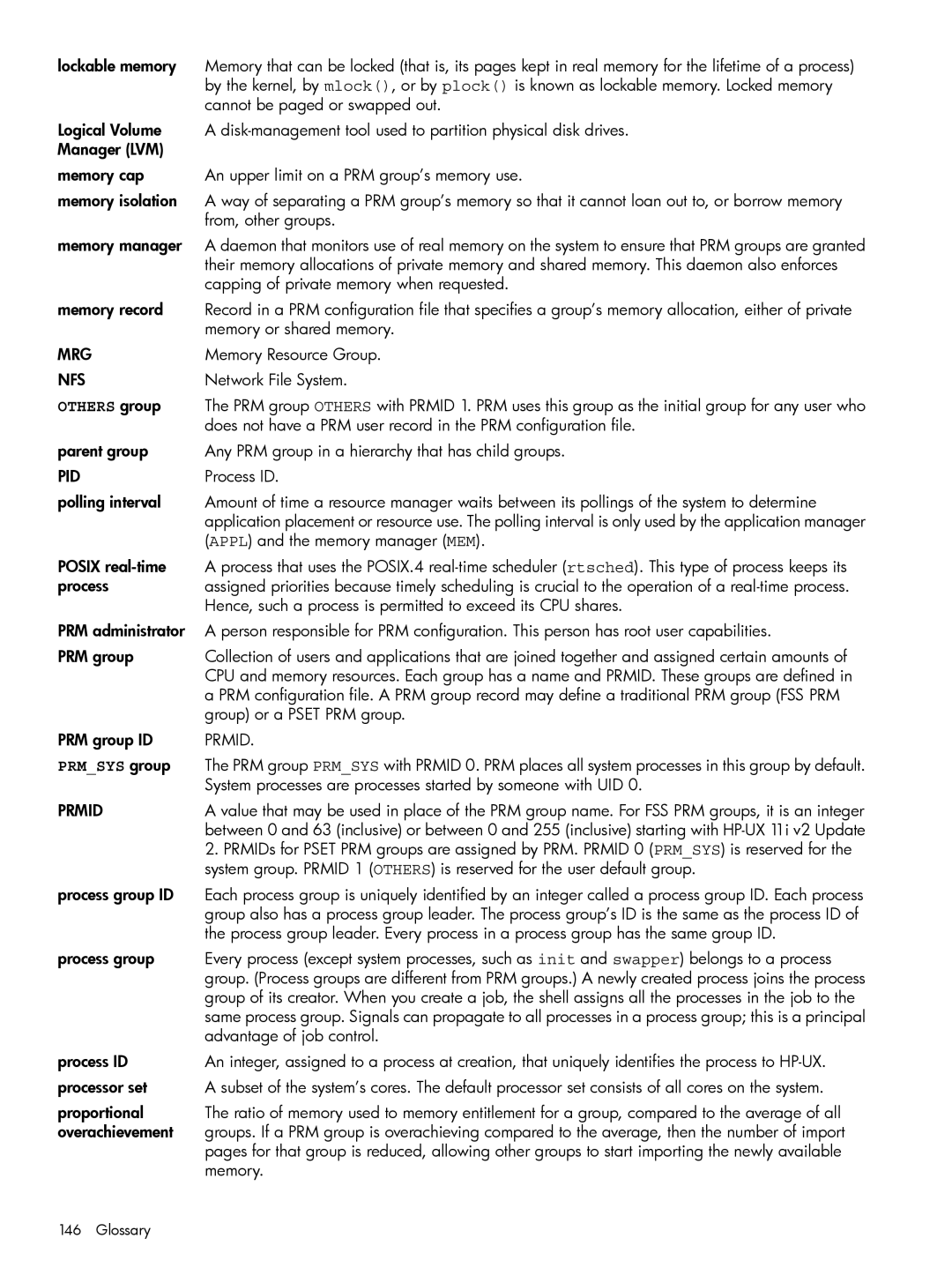lockable memory | Memory that can be locked (that is, its pages kept in real memory for the lifetime of a process) |
| by the kernel, by mlock(), or by plock() is known as lockable memory. Locked memory |
| cannot be paged or swapped out. |
Logical Volume | A |
Manager (LVM) |
|
memory cap | An upper limit on a PRM group’s memory use. |
memory isolation | A way of separating a PRM group’s memory so that it cannot loan out to, or borrow memory |
| from, other groups. |
memory manager | A daemon that monitors use of real memory on the system to ensure that PRM groups are granted |
| their memory allocations of private memory and shared memory. This daemon also enforces |
| capping of private memory when requested. |
memory record | Record in a PRM configuration file that specifies a group’s memory allocation, either of private |
| memory or shared memory. |
MRG | Memory Resource Group. |
NFS | Network File System. |
OTHERS group | The PRM group OTHERS with PRMID 1. PRM uses this group as the initial group for any user who |
| does not have a PRM user record in the PRM configuration file. |
parent group | Any PRM group in a hierarchy that has child groups. |
PID | Process ID. |
polling interval | Amount of time a resource manager waits between its pollings of the system to determine |
| application placement or resource use. The polling interval is only used by the application manager |
| (APPL) and the memory manager (MEM). |
POSIX | A process that uses the POSIX.4 |
process | assigned priorities because timely scheduling is crucial to the operation of a |
| Hence, such a process is permitted to exceed its CPU shares. |
PRM administrator | A person responsible for PRM configuration. This person has root user capabilities. |
PRM group | Collection of users and applications that are joined together and assigned certain amounts of |
| CPU and memory resources. Each group has a name and PRMID. These groups are defined in |
| a PRM configuration file. A PRM group record may define a traditional PRM group (FSS PRM |
| group) or a PSET PRM group. |
PRM group ID | PRMID. |
PRM_SYS group | The PRM group PRM_SYS with PRMID 0. PRM places all system processes in this group by default. |
| System processes are processes started by someone with UID 0. |
PRMID | A value that may be used in place of the PRM group name. For FSS PRM groups, it is an integer |
| between 0 and 63 (inclusive) or between 0 and 255 (inclusive) starting with |
| 2. PRMIDs for PSET PRM groups are assigned by PRM. PRMID 0 (PRM_SYS) is reserved for the |
| system group. PRMID 1 (OTHERS) is reserved for the user default group. |
process group ID | Each process group is uniquely identified by an integer called a process group ID. Each process |
| group also has a process group leader. The process group’s ID is the same as the process ID of |
| the process group leader. Every process in a process group has the same group ID. |
process group | Every process (except system processes, such as init and swapper) belongs to a process |
| group. (Process groups are different from PRM groups.) A newly created process joins the process |
| group of its creator. When you create a job, the shell assigns all the processes in the job to the |
| same process group. Signals can propagate to all processes in a process group; this is a principal |
| advantage of job control. |
process ID | An integer, assigned to a process at creation, that uniquely identifies the process to |
processor set | A subset of the system’s cores. The default processor set consists of all cores on the system. |
proportional | The ratio of memory used to memory entitlement for a group, compared to the average of all |
overachievement | groups. If a PRM group is overachieving compared to the average, then the number of import |
| pages for that group is reduced, allowing other groups to start importing the newly available |
| memory. |
146 Glossary
